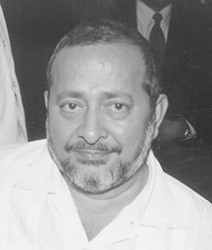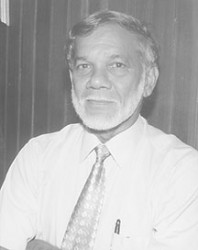As the government continues to face immense pressure to call local government polls, the three government-nominated members of the Guyana Elections Commission (Gecom) yesterday urged caution about the readiness of the agency to proceed.
In a joint statement, Mohamood Shaw, Dr Keshav Mangal and Athmaram Mangar registered their concern about calls for the elections and declarations that Gecom is ready, while highlighting a series of operational issues to be addressed.
“We urge that these calls and declarations be treated with extreme caution,” they declared, while adding that they would continue to work with the Chairman Dr Steve Surujbally and the opposition-nominated commissioners and the Gecom Secretariat to address issues of concern.
The statement signals a divide among the commissioners about the statutory body’s readiness, in light of repeated declarations by Surujbally that Gecom would be prepared to hold the elections once the government identifies a date for the polls. Surujbally has said Gecom has a draft work plan for the conduct of local government elections within a 180-day timeframe.

The elections, due to be held every three years, have not been held since 1997 and the Ramotar administration, which had promised to ensure the polls within a year of taking office, has continued to face continued calls by the political opposition as well as civil society, including the private sector, to hold the elections.
In addition, recently, British High Commission-er to Guyana Andrew Ayre stated that Guyana was in breach of the Common-wealth Charter due to the failure to hold the polls. And prior to his recent departure, former US Ambassador Brent Hardt also made strong appeals for the holding of the elections, which led government to attack amidst accusations of interference in local affairs.
The statement by the three commissioners, however, is in line with a declaration by PPP General Secretary Clement Rohee earlier this year that they were doubtful about the commission’s readiness to hold local government elections.
The commissioners yesterday referred to “operational issues” that are of concern to them, including “constituency boundaries and demarcation issues.”
They explained that some constituency boundaries cut across established Divisions and Sub-Divisions, which requires field operations to effectively allocate existing registrants on the National Register of Registrants to a unique constituency.
Other related constituency issues include the resolution of transfers of numerous electors and the lack of an adequate number of registrants to effectively field adequate lists of candidates in some constituencies.
Another issue and one that has been previously raised is the need for a vigorous education programme to inform and educate the populace on the new local government elections system, which comprise a mixture of the Constituency and Propor-tional Representation models, in which political parties as well as individuals and interested groups may contest the elections.

However, Gecom spokesman Vishnu Persaud is on record as saying that funds to commence intensive public education exercises on local government elections will not be disbursed until government names a substantive date for the run off of the polls. He previously said that the commission is engaged year-round in public education exercises on all of its activities, including local government, and even general elections, but a separate budget which is dedicated in its entirety to public education activities relating to local government elections can only be released by the Ministry of Finance when the local government minister picks a date.
The three commissioners also highlighted that the process to compile and analyse 585 sets of nomination lists, resulting in 585 vetted two-part ballot templates and subsequent printing of ballots will require significant time, effort and resources.
In addition, they pointed out that the analysis of the National Register of Registrants and subsequent printing of lists for the elections require operations that involve Gecom’s Information Technology Division, which they say is without key top level and appropriate staff.
They also said there are some key legislative issues, including lacunae in laws that govern local government elections.
“We believe that if these matters are not addressed, they can lead to disfranchisement,” they warned, while reiterating caution regarding any declarations and assumptions of Gecom’s readiness.
Although President Donald Ramotar, acting Local Government Minis-ter Norman Whittaker and Rohee have given various reasons as to why local government elections cannot be held, these were recently called into question when the president admitted that the delay was due to “the political reality.” “I would prefer to go to the local government elections, but I can’t shut my eyes to the political reality that exists and make a bland promise that I will go to local government elections tomorrow as I would have done [if] we had the majority in the parliament at this point in time. And we would not have been in the position that we are in today,” he said at a recent news conference. As a result, Ambassador Hardt pointed out that the constitution does not say elections every three years except when the executive does not have a majority. “It says every three years,” he noted, adding that PPP General Secretary Rohee’s suggestion that the people are not in the mood for the elections also ignored the constitutional requirement.





